The predominant job in the Ancient Age was under the form of slavery, where the one who carried it out was not paid, as the slave worked for their owner, who had invested money in their purchase, or had been born by a female slave of the master. This continued until the 19th Century.
There were some jobs during this time which were more prestigious than others, like that of the scribes in Egypt, or the sculptors or builders of temples, whose activities were protected in the Code of Hammurabi.
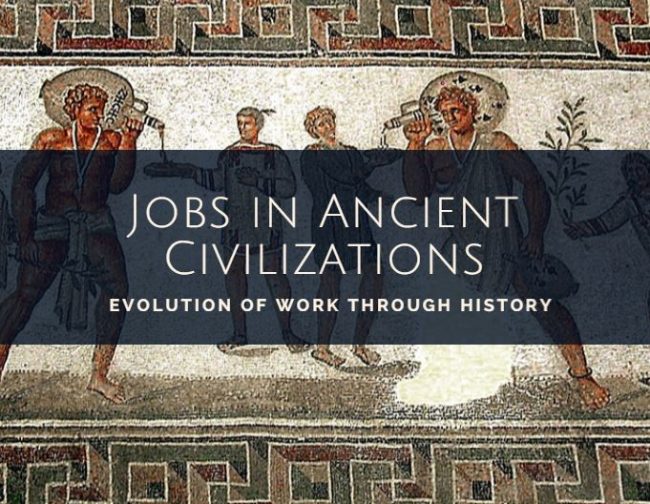
Jobs in Ancient Civilizations
Agricultural activities, although they were fundamental to the ancient and medieval economy, did not place those who practiced them in a place of privilege, but were instead considered to be an activity which supported the more qualified classes. Thus, in the Middle Ages, there existed a distribution of functions between those who fought to safeguard the whole kingdom in its defense (the nobles), those who prayed for the good of all (the clergy), and those who worked for everyone (the peasants), feeding those who did not produce.
Work in Ancient Rome
If work was done, the goal was always to build up an estate to achieve leisure, and in this they resembled the Greeks. Many philosophers of the time, among them Aristotle considered that salaried work impeded man from achieving virtue, and therefore such men should submit themselves to the government by the dignitaries, all virtuous and the only ones with the capacity and the right to govern. Just as much in Rome as in Greece, work was always considered by the upper spheres to be beneath free men. Trade was also looked down on, except for Plato who saw a necessity for it, but apart from him the majority considered that trade should be nothing more than a means to become an owner of lands; a merchant, no matter how rich he might be, was never duly respected if he was not a landowner.
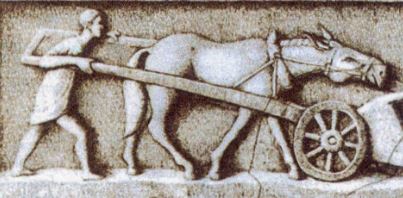
Plato himself indicated that a well-governed city should be maintained by the rural work of the slaves and by the artisanal work of the men of little note, in order to sustain the virtuous lives, whose fundamental characteristic was leisure. Perhaps the biggest misunderstanding of the Greek and Roman traditions regarding the exaltation of the social types is that they did not admire the social progress of an individual in their life, as in the case of freedmen or of the poor freemen who after years of struggle were able to gather significant wealth. It is a relevant difference between the Greco-Roman traditions and the modern Western traditions, above all the North American traditions, where the “American Dream” is emphasized and encouraged: the classic example of a newspaper seller who achieves enviable fortunes, above all if we consider that there were not a few cases in the Roman world in which one born a slave was able to gain his freedom and later become a philosopher.
Trade was looked down on, “attributing to the merchant all imaginable vices: he is rootless, only acts in greed, carries inside him the seed of all evils, engenders opulence, softness, and falsifies nature, because he directs himself to far-off worlds from which the natural barrier of the seas separates us and brings from there products which nature did not desire to make grow among us.”
It is certain that we can find this idea associated with the disdain for commerce in several different cultures. Thus, being rich did not mean having money so much as being a landowner, as a way of rejecting the upstart and pushing them towards agriculture. Because of this as well, an heir, a rich and land-owning individual, was not considered a merchant no matter how much he might dedicate himself to trade, the most important was not having started with such an activity. In the same way, all those who did not possess a personal fortune, an estate, were considered poor, no matter whether they were clients or musicians or grammarians. The free man was that man who possessed sufficient wealth not to work, that is to say, to dedicate himself to leisure.
Public positions were well or poorly considered according to the posts and the places, without any apparent logic existing for their qualification as an honor or a job. For example, a governor of Africa with a lavish salary was considered an honor, a public function, while a governor of Egypt with the same salary, according to what the people said, did not carry out a public function. Perhaps it was because the governors of Africa were designated by the old Senate while those of Egypt were recruited from a body of imperial functionaries.
There also existed some paradoxes regarding the admiration or disdain for the same activity carried out by different people. A noble who was also a businessman was very admired, while a simple free man who was a merchant was generally looked down on. The same occurred with professions, no one admired an agricultural businessman, but if the one who dedicated himself to such an activity was a prominent person, they constantly praised him. “Whatever he does, a dignitary or a noble will never be defined by it; however a poor man is a shoemaker or a day laborer.” Perhaps the most well-known example is that of Marcus Aurelius, emperor and philosopher, in whose case his philosophical occupation was even considered to be more merit because he had no necessity to be a philosopher.
As much as work was disdained (in the upper spheres), the political dignitaries had to extol it, because after all it was the work of the majority which sustained the pleasures of a minority. The city “was an institution which was superimposed over the natural human society so that its members should lead a more elevated existence.” The poor were not to work in order to collaborate with the city but instead to keep misery from inciting them to crime. According to Socrates, “the poor people were pointed towards the cultivation of the land and to commerce because it was very well known that indigence is born of laziness, and crime, of indigence.” However, the country was looked down on, and even more than the country, the labors of the fields; the prominent men lived in the cities, not in the country; from the cities they attended to the financial tasks of the country, which as we said, was a mark of admiration; being admired, however, nothing more than their possession.
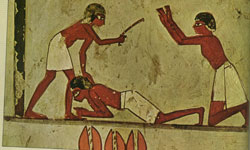
Regarding the admiration or disdain which was had for the white-collar professions, nothing is clear; in a certain sense the notables and philosophers disdained salaried workers, and many professionals were salaried; that which alleviated their position slightly was to be the client of someone notable, by which, theoretically, they ceased to be salaried. Nevertheless, many emperors, whose occupation was to be the guardian, or tutor of the totality of the Roman people, effectively protected the work of the people, whether by providing them the resources, or looking after their interests (like Augustus), or rejecting the use of machines for constructions (like Vespasian with the Colosseum). In addition, the disdain for work was not characteristic of the whole Empire; in other places, it was admired, like in Pompey or in Africa, where rich traders verbally announced their profession, or even better, wrote it on their epitaph (an always fairly expensive signal of wealth).
The elevation of work was the pride of the middle class, which was by no means the majority but were much more wealthy than the plebeians and at times as rich as the nobles; the middle class was mainly made up of freedmen who had found in production and trade a way to start a family dynasty (their children were born free): bakers, butchers, sellers of wine or of clothing, at times rich but without possessing urban nobility. The wealthy freedmen knew how to read and write, and went to school up to twelve years old. Saint Paul was a representative of said middle class, son of a tent maker, he dedicated his work to Corinthian disciples of the same class.
In antiquity, a baker, a butcher or a trader were not simple storekeepers but rich plebeians, with accumulated capital and slaves who worked for them. The Roman plebeians were composed of three economic classes: that which lived day by day and had to be content with minimal food; the poor storekeepers and traders without capital who buy today to sell tomorrow; and finally the rich traders with enough capital saved up to buy wholesale or with the capacity to store their products, without being a large wholesaler. Even in Pompey, the differences between the rich shopkeepers and the poor are noticed; the last lived in the attic of the business, climbing a short stairway, while the first owned large and splendid houses, a Domus with a courtyard five hundred square meters in surface area.
The historian states in conclusion that the Romans did not disdain work, but those who were obligated to work in order to survive, and that therefore it is an error to say that the old sages disdained utility or the practical applications of the constructions produced by work.
Work facing the development of Christianity
With the appearance and diffusion of Christianity throughout the Roman Empire, the classical social and political structures would be overturned in diverse aspects. Thus, in its vision of work, Christianity acts from a transformation in depth and is distinguished from the classical pagan vision linking the necessary productive activity to the men with a divine obligation. In the Christian doctrine of original sin, work is found as one of the punishments inflicted by God on men, due to Adam’s disobedience: “By the sweat of your brow you will eat bread.”
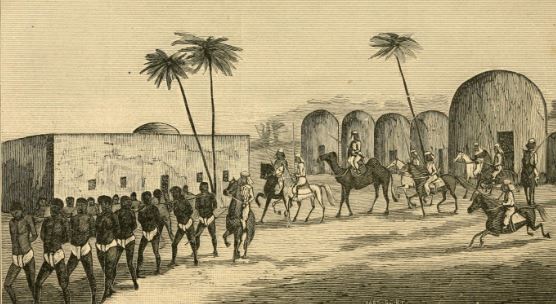
Since then, the distinction made in the activities between those who practice them tended to be progressively blurred. In effect, the professed equality of all (baptized) men before God made the question of slavery a delicate issue for Christians, who saw in it a clear incompatibility with the doctrine of the Church. In the same way, the first Christian communities regrouped indiscriminately free men and slaves, many of whom clearly exercised artisanal activities.
On the other hand, as Pierre Vidal-Naquet has demonstrated, for Greece slaves did not constitute a social class in the Marxist sense of the term. This is explained by the fact that slaves could occupy all the functions at the heart of the city, except for the political (and therefore religious) and military ones: they could be at the service of a master or of the city itself. However, above all, nothing permits us to perceive the existence of an awareness of interests or of collective recognition.
The nonexistence of a network of the servile social class, but also the fact that the statutes of free men and slaver were not fixed, permitted the progressive transformation carried out by Christianity. Due to the important place occupied by slavery in productive activity, the job post and its conception acquired a new aspect with the development of Christianity, and it was promptly established as the official religion of the Roman Empire.
As Moses I. Finley analyzed: “One of the aspects of Greek history is, in short, the advance, hand in hand, of liberty and slavery.”
One of the paradoxes of Classical Antiquity is having developed in an equal way a status of free man and slave, in which the first owed his existence in great part to the second. In effect, in the Greco-Roman world, work was only conceived of as a necessity of subsistence and was not the object of any theory regarding its function at the heart of society. However, for the free man, as a function of his means, this necessity could be facilitated, vacated by the servile work. This utilization of slaves permitted certain free men to exercise their “profession as a citizen,” to take up one of Claude Nicolet’s terms.
With the progressive disappearance of slavery as an institution, work acquired a new social and religious dimension, pushed in part by Christian doctrine. In effect, as an imperative dictated by God to men, every individual is theoretically obligated to submit themselves, independently of their condition.
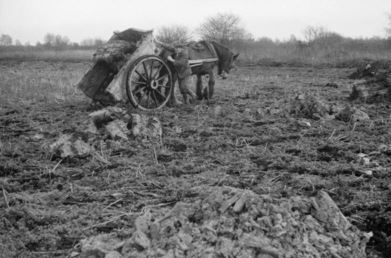
In the ancient pagan world, as we have seen, the status of individuals and institutions were subject to evolution and changed during the whole period. With the development of Christianity, this mobility of status tended to be blurred, which had as an indirect consequence not a new liberty for individuals respecting work, but instead a kind of wide emancipation. To use the terms employed by the Romans, men were not liberated but set free.
Lastly, the consequences of such evolution are, indirectly, an in-depth transformation of the political and social structures. While liberty and slavery were two inseparable and paradoxically complementary aspects of the pagan world, only the status of the worker would be conserved with the establishment of Christianity. And this would prefigure the establishment of three medieval orders (those who work, those who fight, and those who pray), which would evolve until the end of the Old Regime in the Third State, Nobility and Clergy.
Work was then not only a necessity for subsistence but also acquired a true social function. It characterized a whole swath of society which would be organized around it. It became at the same time a religious obligation and a duty.
